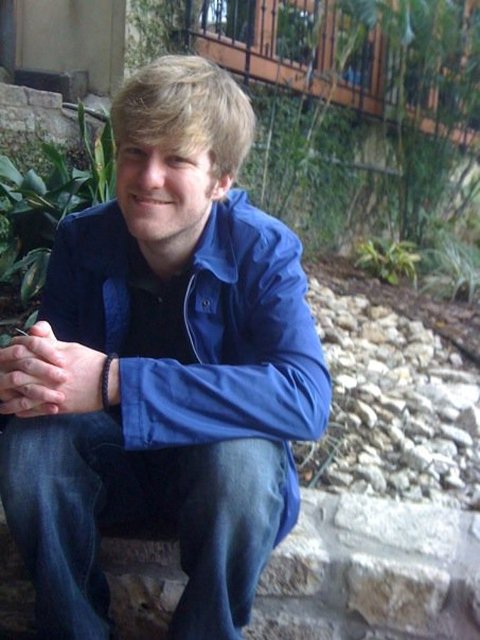Baylor Senior Wins Fulbright ETA to Russia

Ross D. Irons
Follow us on Twitter: @BaylorUMediaCom
Baylor University senior Ross D. Irons, a double major in Russian and German from Austin, Texas, has been selected for the Fulbright Scholarship, the flagship international educational exchange program sponsored by the U.S. Department of State. Irons will teach English in Russia during the 2010-2011 academic year as part of the Fulbright English Teaching Assistantships (ETA) Program, an element of the Fulbright U.S. Student Program.
Irons is Baylor's 21st Fulbright recipient since 2001.
The Fulbright ETA program places U.S. students as English teaching assistants in schools or universities overseas to improve foreign students' English language abilities and knowledge of the United States, while increasing their own language skills and knowledge of the host country.
After meeting with Baylor's Fulbright representative Elizabeth Vardaman, Irons decided to pursue the Fulbright because of the prestigious scholarship's generous funding and the opportunity to be fully integrated into a Russian university and community.
"I want to pursue a Ph.D. in Slavic literature, so I was looking for a way to spend a year in Russia to get my language skills up to a higher level so I could really do well in grad school," Irons said.
"I've always been really interested in languages," he added. "I took German in high school and Russian when I got to Baylor. I just kind of got interested in Russian culture and wanted to learn the language, so now it's brought me here and hopefully will take me further."
Vardaman said Irons will be a fine ambassador for the United States, as well as an effective classroom teacher of English.
"His caring spirit elicits dialogue and goodwill," Vardaman said. "His impressive knowledge of Russian language, literature and culture will enable him to build relationships with his students while he engages them in learning about our language, literature and culture. We are so excited for him -- and for those who will learn from him."
Although he has not yet been assigned a city in Russia, Irons will be teaching English 20 hours a week, with the rest of his time spent in the community and with tutors and Russian professors to work on his grasp of the Russian language. In addition, Fulbright ETAs may conduct a side research project while in their host country. Irons plans to research the relationship between Christians and Muslims in Russia.
"There is a long tradition of Muslims and Christians living in Russia since about the 1100s," Irons said. "At times, they've gotten along peacefully and at times not so much. It's a needed area of research."
In 2008, Irons received a Critical Language Scholarship, another program sponsored by the U.S. Department of State and Bureau of Educational and Cultural Affairs. He studied Russia in Astrakhan, Russia, near the Caspian Sea, while attending the state university there. He spent the spring 2009 semester studying abroad in Freiburg, Germany.
Dr. Michael Long, professor of Russian and director of Slavic and East European studies, said Irons is a highly motivated, linguistically talented student, studying both Russian and German simultaneously.
"Ross's superb linguistic skills together with his extensive experience living and studying in Russia will make him a successful teacher," Long said. "He is an outstanding example of a Baylor graduate, and he will be an excellent representative both of the United States and of Baylor. We are all very proud of him in the department of modern foreign languages."
Irons credits Vardaman for her guidance and encouragement during the Fulbright process. He also thanked his Russian professors, Long and Dr. Adrienne Harris, and "all my German professors" - Dr. Andrew Wisely, Dr. Jennifer Good, Dr. Ann McGlashan and Professor Rita Abercrombie - who were instrumental in shaping his dream to pursue a doctorate in literature.
"I never would've expected coming to Baylor that when I left the university, I would want to go for a Ph.D.," Irons said, who visited Baylor during Fall Premiere of his senior year in high school.
"My parents and I talked with the foreign language professors, the German and Russian professors, and were completely impressed with their program and with the professors themselves on a personal level," Irons said. "I didn't really want to go to a big school. At a smaller school, you really get to know your professors and you get to know other students, and I've really benefited from the small class atmosphere."
The Fulbright program was established in 1946 by the U.S. Congress to increase mutual understanding between the people of the United States and the people of other countries. The program has provided thousands of students - chosen for their academic merit and leadership potential - with the opportunity to study, teach and conduct research, exchange ideas and contribute to finding solutions to shared international concerns.
For more information about scholarship opportunities at Baylor, visit the Office of National and International Scholarships.
Media contact: Lori Fogleman, director of media communications, (254) 710-6275